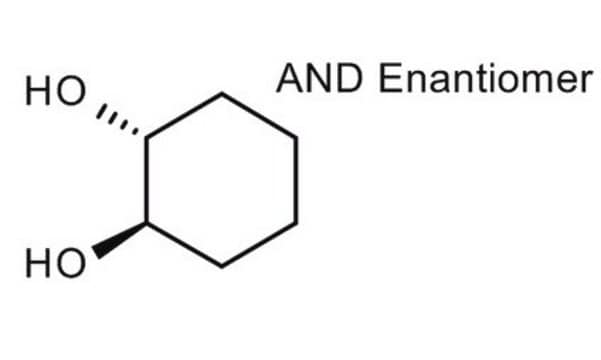361267
cis-1,2-Cyclohexanediol
99%
Se connecterpour consulter vos tarifs contractuels et ceux de votre entreprise/organisme
About This Item
Formule linéaire :
C6H10(OH)2
Numéro CAS:
Poids moléculaire :
116.16
Beilstein:
1340578
Numéro MDL:
Code UNSPSC :
12352100
ID de substance PubChem :
Nomenclature NACRES :
NA.22
Produits recommandés
Essai
99%
Pf
97-101 °C (lit.)
Groupe fonctionnel
hydroxyl
Chaîne SMILES
O[C@@H]1CCCC[C@@H]1O
InChI
1S/C6H12O2/c7-5-3-1-2-4-6(5)8/h5-8H,1-4H2/t5-,6+
Clé InChI
PFURGBBHAOXLIO-OLQVQODUSA-N
Vous recherchez des produits similaires ? Visite Guide de comparaison des produits
Description générale
Core-shell-like silica nickel species nanoparticle catalyzed dehydrogenation of 1,2-cyclohexanediol to catechol is reported. Crystal structure of a Cr(V) complex with cis-1,2-cyclohexanediol is reported. Enzymatic oxidation of cis-1,2-cyclohexanediol by Gluconobacter oxydans (ATCC 621) is reported.
Code de la classe de stockage
11 - Combustible Solids
Classe de danger pour l'eau (WGK)
WGK 3
Point d'éclair (°F)
Not applicable
Point d'éclair (°C)
Not applicable
Équipement de protection individuelle
Eyeshields, Gloves, type N95 (US)
Faites votre choix parmi les versions les plus récentes :
Déjà en possession de ce produit ?
Retrouvez la documentation relative aux produits que vous avez récemment achetés dans la Bibliothèque de documents.
Les clients ont également consulté
Ruben Bartholomäus et al.
Inorganic chemistry, 52(8), 4282-4292 (2013-03-28)
The stabilization of Cr(V) by biological 1,2-diolato ligands, including carbohydrates, glycoproteins, and sialic acid derivatives, is likely to play a crucial role in the genotoxicity of Cr(VI) and has also been implicated in the antidiabetic effect of Cr(III). Previously, such
Oxidation of trans-and cis-1, 2-cyclohexanediol by Gluconobacter oxydans.
Adlercreutz P.
Applied Microbiology and Biotechnology, 30(3), 257-263 (1989)
Bao-Hui Chen et al.
Dalton transactions (Cambridge, England : 2003), 44(3), 1023-1038 (2014-11-20)
A simple and convenient approach denoted as gel-deposition-precipitation (G-D-P) for the preparation of core-shell-like silica@nickel species nanoparticles was studied systematically. Core-shell-like silica@nickel species nanoparticles consisted of a Si-rich core and a Ni-rich shell. The G-D-P process included two steps: one
Yoshihito Shiota et al.
Inorganic chemistry, 50(13), 6200-6209 (2011-06-04)
The catalytic conversion of 1,2-cyclohexanediol to adipic anhydride by Ru(IV)O(tpa) (tpa ═ tris(2-pyridylmethyl)amine) is discussed using density functional theory calculations. The whole reaction is divided into three steps: (1) formation of α-hydroxy cyclohexanone by dehydrogenation of cyclohexanediol, (2) formation of
M Shahjahan Kabir et al.
The Journal of organic chemistry, 75(11), 3626-3643 (2010-05-01)
cis-1,2-Cyclohexanediol (L3) has been shown to be an efficient and versatile bidentate O-donor ligand that provides a highly active Cu-catalytic system. It was more effective than diols such as trans-1,2-cyclohexanediol or ethylene glycol. This commercially available cis-1,2-cyclohexanediol ligand facilitated the
Notre équipe de scientifiques dispose d'une expérience dans tous les secteurs de la recherche, notamment en sciences de la vie, science des matériaux, synthèse chimique, chromatographie, analyse et dans de nombreux autres domaines..
Contacter notre Service technique










